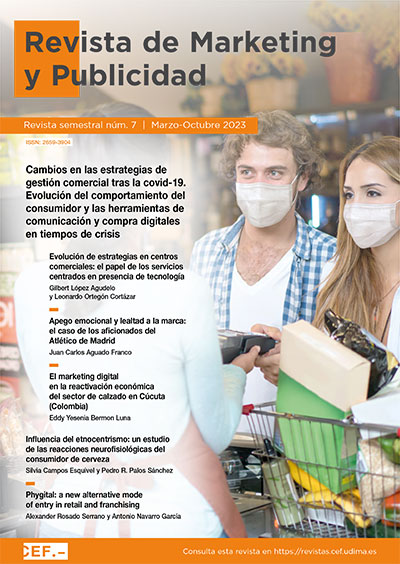Apego emocional y lealtad a la marca: el caso de los aficionados del Atlético de Madrid en la etapa poscovid
DOI:
https://doi.org/10.51302/marketing.2023.7205Palabras clave:
consumer engagement, apego emocional, Atlético de Madrid, marketing, marca, fidelidad, fútbolResumen
El apego emocional es un concepto relacionado con la lealtad de marca, y que establece que el objetivo de marketing que deberían tener las empresas tendría que encaminarse, más allá de ofrecer mejores bienes y servicios y reducir los costes para abaratar el precio de los productos, hacia la búsqueda de crear y fomentar un vínculo estrecho y duradero; un apego emocional con los clientes.
A través de las respuestas a una encuesta efectuada a un grupo de seguidores, comprenderemos las actitudes y decisiones tomadas por los aficionados a un equipo de fútbol que son especialmente reconocidos por su «lealtad de marca» y que cuentan con un fuerte «apego emocional», es decir, por su fidelidad a sus colores: los seguidores del Atlético de Madrid. Así, esa fidelidad se ha mostrado no solamente a través de diferentes situaciones a lo largo de la historia, sino que se ha visto corroborada en la encuesta que se ha realizado en este estudio en la época poscovid.
A pesar de que los jugadores con los que cuenta un equipo de fútbol representan unos activos e inversiones ciertamente muy relevantes, los gestores deportivos deben concentrar sus esfuerzos en la gestión de la marca del equipo, ya que esta constituye uno de los activos más importantes del club.
Las decisiones tomadas por los gestores del club deberían tomar en cuenta las preferencias de los aficionados, pues una correcta gestión del costumer engagement depende de una fructífera relación entre empresa y clientes.
Descargas
Citas
Afthinos, Y., Theodorakis, N. D. y Howat, G. (2017). How do perceptions of other customers affect satisfaction and loyalty in public aquatic centres? Managing Sport and Leisure, 22(6), 428-441. https://doi.org/10.1080/23750472.2018.1513340
Aro, K., Suomi, K. y Saraniemi, S. (2018). Antecedents and consequences of destination brand love — A case study from Finnish Lapland. Tourism Management, 67, 71-81. https://doi.org/10.1016/j.tourman.2018.01.003
Baena, V. (2016). Online and mobile marketing strategies as drivers of brand love in sports teams: Findings from Real Madrid. International Journal of Sports Marketing and Sponsorship, 17(3), 202-218. https://doi.org/10.1108/ijsms-08-2016-015
Behnam, M., Hollebeek, L. D., Clark, M. K. y Farabi, R. (2021). Exploring customer engagement in the product vs. service context. Journal of Retailing and Consumer Services, 60(102456). https://doi.org/10.1016/j.jretconser.2021.102456
Bijmolt, T. H. A., Leeflang, P. S. H., Block, F., Eisenbeiss, M., Hardie, B. G. S., Lemmens, A. y Saffert, P. (2010). Analytics for customer engagement. Journal of Service Research, 13(3), 341-356. https://doi.org/10.1177/1094670510375603
Bloemer, J. M. y Kasper, H. D. P. (1995). The complex relationship between consumer satisfaction and brand loyalty. Journal Of Economic Psychology, 16(2), 311–329. https://doi.org/10.1016/0167-4870(95)00007-b
Bowden, J. (2009). Customer engagement: A framework for assessing customer-brand relationships: The case of the restaurant industry. Journal of Hospitality Marketing y Management, 18(6), 574-596. https://doi.org/10.1080/19368620903024983
Brodie, R. J., Hollebeek, L. D., Juric´, B. y Ilic´, A. (2011). Customer engagement: Conceptual domain, fundamental propositions, and implications for research. Journal of Service Research, 14(3), 252-271. https://doi.org/10.1177/1094670511411703
Brodie, R. J., Ilic, A., Juric, B. y Hollebeek, L. (2013). Consumer engagement in a virtual brand community: An exploratory analysis. Journal of Business Research, 66(1), 105-114. https://doi.org/10.1016/j.jbusres.2011.07.029
Carroll, B. A. y Ahuvia, A. C. (2006). Some antecedents and outcomes of brand love. Marketing Letters, 17(2), 79-89. https://doi.org/10.1007/s11002-006-4219-2
Casaló, L., Flavián, C. y Guinalíu, M. (2007). The impact of participation in virtual brand communities on consumer trust and loyalty: The case of free software. Online Information Review, 31(6), 775-792. https://doi.org/10.1108/14684520710841766
Chan, K. W. y Li, S. Y. (2010). Understanding consumer-to-consumer interactions in virtual communities: The salience of reciprocity. Journal of Business Research, 63(9-10), 1.033-1.040. https://doi.org/10.1016/j.jbusres.2008.08.009
Chandler, J. D. y Lusch, R. F. (2015). Service systems: A broadened framework and research agenda on value propositions, engagement, and service experience. Journal of Service Research, 18(1), 6-22. https://doi.org/10.1177/1094670514537709
Chathoth, P. K., Ungson, G. R., Harrington, R. J. y Chan, E. S. W. (2016). Co-creation and higher order customer engagement in hospitality and tourism services: A critical review. International Journal of Contemporary Hospitality Management, 28(2), 222-245. https://doi.org/10.1108/ijchm-10-2014-0526
Chiu, W., Won, D. y Bae, J.-S. (2019). Customer value co-creation behaviour in fitness centres: how does it influence customers’ value, satisfaction, and repatronage intention? Managing Sport and Leisure, 24(1-3), 32-44. https://doi.org/10.1080/23750472.2019.1579666
Erichsen, M., Stiklestad, T., Holum, M. y Jakobsen, T. G. (2022). Added value for sponsors: a study of network in football 2011-2018. Sport Business and Management an International Journal, 12(4), 421-439. https://doi.org/10.1108/sbm-11-2020-0119
Gambetti, R. C. y Graffigna, G. (2010). The concept of engagement: A systematic analysis of the ongoing marketing debate. International Journal of Market Research, 52(6), 801-826. https://doi.org/10.2501/s147078531020166
Gambetti, R. C., Graffigna, G. y Biraghi, S. (2012). The Grounded Theory approach to consumer-brand engagement: The practitioner’s standpoint. International Journal of Market Research, 54(5), 659-687. https://doi.org/10.2501/ijmr-54-5-659-687
Greve, G. (2014). The moderating effect of customer engagement on the brand image – brand loyalty relationship. Procedia, Social and Behavioral Sciences, 148, 203-210. https://doi.org/10.1016/j.sbspro.2014.07.035
Hapsari, R., Clemes, M. D. y Dean, D. (2017). The impact of service quality, customer engagement and selected marketing constructs on airline passenger loyalty. International Journal of Quality and Service Sciences, 9(1), 21-40. https://doi.org/10.1108/IJQSS-07-2016-0048
Harmeling, C. M., Moffett, J. W., Arnold, M. J. y Carlson, B. D. (2017). Toward a theory of customer engagement marketing. Journal of the Academy of Marketing Science, 45(3), 312-335. https://doi.org/10.1007/s11747-016-0509-2
Hollebeek, L. D. (2011). Demystifying customer brand engagement: Exploring the loyalty nexus. Journal of Marketing Management, 27(7-8), 785-807. https://doi.org/10.1080/0267257x.2010.500132
Hollebeek, L. D. y Belk, R. (2021). Consumers’ technology-facilitated brand engagement and wellbeing: Positivist TAM/PERMA- vs. Consumer Culture Theory perspectives. International Journal of Research in Marketing, 38(2), 387-401. https://doi.org/10.1016/j.ijresmar.2021.03.001
Hollebeek, L. D., Srivastava, R. K. y Chen, T. (2019). S-D logic-informed customer engagement: integrative framework, revised fundamental propositions, and application to CRM. Journal of the Academy of Marketing Science, 47(1), 161-185. https://doi.org/10.1007/s11747-016-0494-5
Hollebeek, L. D., Keeling, D. I. y Ruyter, K. de. (2022). Customer engagement design in industrial innovation. Industrial Marketing Management, 106, 83-89. https://doi.org/10.1016/j.indmarman.2022.07.010
Hollebeek, L. D., Kumar, V. y Srivastava, R. K. (2022). From customer-, to actor-, to stakeholder engagement: Taking stock, conceptualization, and future directions. Journal of Service Research, 25(2), 328-343. https://doi.org/10.1177/1094670520977680
Itani, O. S., El Haddad, R. y Kalra, A. (2020). Exploring the role of extrovert-introvert customers’ personality prototype as a driver of customer engagement: Does relationship duration matter? Journal of Retailing and Consumer Services, 53(101980). https://doi.org/10.1016/j.jretconser.2019.101980
Kumar, V., Aksoy, L., Donkers, B., Venkatesan, R., Wiesel, T. y Tillmanns, S. (2010). Undervalued or overvalued customers: Capturing total customer engagement value. Journal of Service Research, 13(3), 297-310. https://doi.org/10.1177/1094670510375602
Kuvykaite˙, R. y Tarute˙, A. (2015). A critical analysis of consumer engagement dimensionality. Procedia, Social and Behavioral Sciences, 213, 654-658. https://doi.org/10.1016/j.sbspro.2015.11.468
Langner, T., Bruns, D., Fischer, A. y Rossiter, J. R. (2016). Falling in love with brands: a dynamic analysis of the trajectories of brand love. Marketing Letters, 27(1), 15-26. https://doi.org/10.1007/s11002-014-9283-4
Lombart, C. y Louis, D. (2012). Consumer satisfaction and loyalty: Two main consequences of retailer personality. Journal of Retailing and Consumer Services, 19(6), 644-652. https://doi.org/10.1016/j.jretconser.2012.08.007
Malcuite, J. (2012). Customer Brand Engagement on Online Social Media Platforms. Aarhus University.
Mollen, A. y Wilson, H. (2010). Engagement, telepresence and interactivity in online consumer experience: Reconciling scholastic and managerial perspectives. Journal of Business Research, 63(9-10), 919-925. https://doi.org/10.1016/j.jbusres.2009.05.014
Muñiz, A. M. Jr. y O’Guinn, T. C. (2001). Brand community. The Journal of Consumer Research, 27(4), 412-432. https://doi.org/10.1086/319618
Muñiz, A. M. Jr. y Schau, H. J. (2005). Religiosity in the abandoned apple newton brand community. The Journal of Consumer Research, 31(4), 737-747. https://doi.org/10.1086/426607
Pansari, A. y Kumar, V. (2017). Customer engagement: the construct, antecedents, and consequences. Journal of the Academy of Marketing Science, 45(3), 294-311. https://doi.org/10.1007/s11747-016-0485-6
Patterson, P., Yu, T. y Ruyter, K. de (2006, December). Understanding customer engagement in services. En Advancing theory, maintaining relevance, proceedings of ANZMAC 2006 conference, Brisbane (pp. 4-6).
Prentice, C. y Correia Loureiro, S. M. (2017). An asymmetrical approach to understanding configurations of customer loyalty in the airline industry. Journal of Retailing and Consumer Services, 38, 96-107. https://doi.org/10.1016/j.jretconser.2017.05.005
Prentice, C., Wang, X. y Loureiro, S. M. C. (2019). The influence of brand experience and service quality on customer engagement. Journal of Retailing and Consumer Services, 50, 50-59. https://doi.org/10.1016/j.jretconser.2019.04.020
Rauschnabel, P. A. y Ahuvia, A. C. (2014). You’re so lovable: Anthropomorphism and brand love. Journal of Brand Management, 21(5), 372-395. https://doi.org/10.1057/bm.2014.14
Schau, H. J. y Muñiz, A. M., Jr. (2006). A tale of tales: the Apple Newton narratives. Journal of Strategic Marketing, 14(1), 19-33. https://doi.org/10.1080/09652540500511255
Scholer, A. A. y Higgins, E. T. (2009). Exploring the complexities of value creation: The role of engagement strength. Journal of Consumer Psychology: The Official Journal of the Society for Consumer Psychology, 19(2), 137-143. https://doi.org/10.1016/j.jcps.2009.02.007
Thomson, M., MacInnis, D. J. y Whan Park, C. (2005). The ties that bind: Measuring the strength of consumers’ emotional attachments to brands. Journal of Consumer Psychology: The Official Journal of the Society for Consumer Psychology, 15(1), 77-91. https://doi.org/10.1207/s15327663jcp1501_10
Van Doorn, J. (2011). Comment: Customer engagement: Essence, dimensionality, and boundaries. Journal of Service Research, 14(3), 280-282. https://doi.org/10.1177/1094670511414585
Van Doorn, J., Lemon, K. N., Mittal, V., Nass, S., Pick, D., Pirner, P. y Verhoef, P. C. (2010). Customer engagement behavior: Theoretical foundations and research directions. Journal of Service Research, 13(3), 253-266. https://doi.org/10.1177/1094670510375599
Venkatesan, R. (2017). Executing on a customer engagement strategy. Journal of the Academy of Marketing Science, 45(3), 289-293. https://doi.org/10.1007/s11747-016-0513-6
Verhoef, P. C., Reinartz, W. J. y Krafft, M. (2010). Customer engagement as a new perspective in customer management. Journal of Service Research, 13(3), 247-252. https://doi.org/10.1177/1094670510375461
Vinerean, S., Opreana, A. y ¸Tichindelean, M. (2014). Analyzing consumer engagement programs from the perspective of a qualitative research of marketing executives. Procedia Economics and Finance, 16, 621-630. https://doi.org/10.1016/s2212-5671(14)00849-1
Vivek, S. D., Beatty, S. E. y Morgan, R. M. (2012). Customer engagement: Exploring customer relationships beyond purchase. The Journal of Marketing Theory and Practice, 20(2), 122-146. https://doi.org/10.2753/mtp1069-6679200201
Voyles, B. (2007). Beyond Loyalty: Meeting the Challenge of Customer Engagement. Economist Intelligence Unit. http://graphics.eiu.com/files/ad_pdfs/eiu_AdobeEngagementPt_I_wp.pdf
Watson, G. F. IV, Beck, J. T., Henderson, C. M. y Palmatier, R. W. (2015). Building, measuring, and profiting from customer loyalty. Journal of the Academy of Marketing Science, 43(6), 790-825. https://doi.org/10.1007/s11747-015-0439-4
Descargas
Publicado
Cómo citar
Número
Sección
Licencia
Derechos de autor 2023 Juan Carlos Aguado Franco

Esta obra está bajo una licencia internacional Creative Commons Atribución-NoComercial-SinDerivadas 4.0.





















